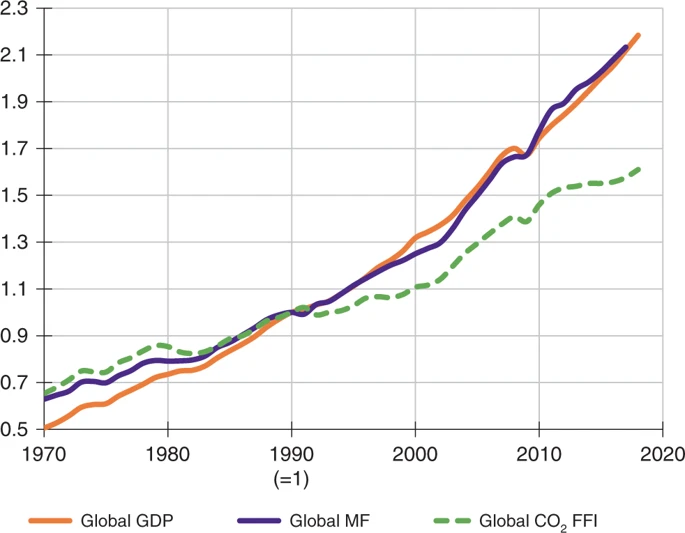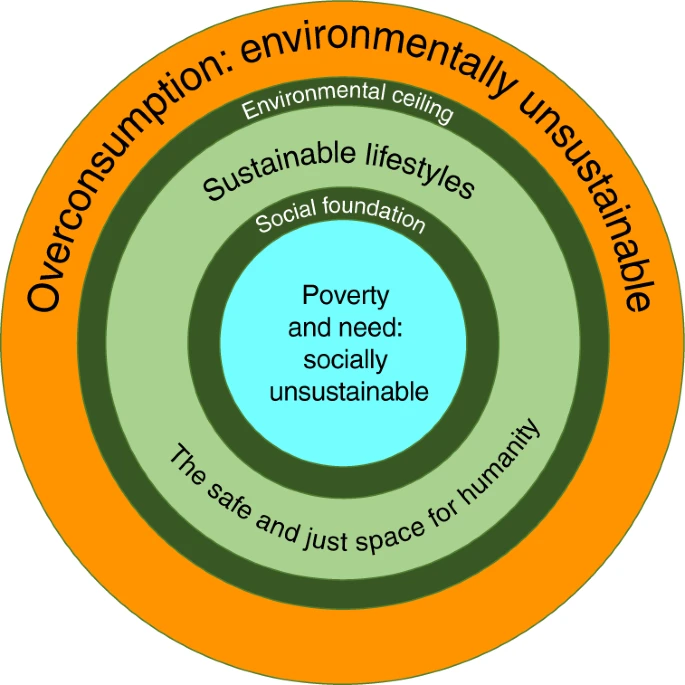A group of researchers, led by a UNSW scientist specializing in sustainable development, reviewed existing academic discussions on the link between wealth, the economy and the associated impacts, to come to a clear conclusion: technology will not take us far down the path of sustainable development – we need profound changes in our way of life and different economic paradigms.
In their study, published in Nature Communications and entitled "Scientists' Warning on Affluence",the researchers summarized the available evidence, identifying possible solutions.
"Recent warnings from scientists have done an excellent job of describing the many perils facing our natural world due to climate, biodiversity and food systems crises, to name a few," says lead author Professor Tommy Wiedmann of UNSW Engineering.
"However, none of these warnings explicitly took into account the role of growth-oriented economies and the search for abundance. In the warning of our scientists, we identify the underlying forces of overconsumption and outline the measures needed to tackle the overwhelming "power" of consumption and the paradigm of economic growth – that is the vacuum we fill.
Relative changes in key global economic and environmental indicators from 1970 to 2017.

Data sources: https://www.resourcepanel.org/global-material-flows-database, http://www.globalcarbonatlas.org and https://data.worldbank.org.
"The main conclusion of our study is that we cannot rely solely on technology to solve existential environmental problems – such as climate change, biodiversity loss and pollution – but that we must also change our rich lifestyles and reduce overconsumption, in combination with structural changes."
Over the past 40 years, the growth of global wealth has consistently outpaced any efficiency gains.
"Technology can help us consume more efficiently, saving energy and resources, but these technological improvements cannot keep pace with our ever-increasing consumption levels," says Professor Wiedmann.
Reducing overconsumption in the world's richest countries
According to Julia Steinberger, co-author and professor of ecological economics at the University of Leeds, wealth is often presented as something to be aspired to.
"But our article has shown that it is in fact dangerous and leads to destruction on a global scale. To protect ourselves from the worsening climate crisis, we must reduce inequality and challenge the notion that wealth, and those that possess it, is inherently good."
In fact, researchers argue that the world's rich citizens are responsible for most of the environmental impacts and are at the heart of any future prospect of retreating to safer conditions.
"The consumption of affluent households around the world is by far the most important – and fastest – determinant of the increase in global environmental and social impacts," says co-author Lorenz Keysser of ETH Zurich.
"Current discussions on how to deal with ecological crises within science, politics and social movements must recognize the responsibility of the richest in these crises."
The researchers say that overconsumption and attendance need to be addressed through lifestyle changes.
"This is almost never recognized, but any transition to sustainability can only be effective if technological advances are complemented by far-reaching lifestyle changes," says co-author Manfred Lenzen, professor of sustainability research at the University of Sydney.
"I am often asked to explain this issue at social meetings. Usually, I say that what we see or associate with our current environmental problems (cars, electricity, airplanes) is just the tip of our personal iceberg. It is all the things we consume and the destruction of the environment they embody that form the submerged part of the iceberg. Unfortunately, once we understand this, the implications for our way of life are often so confronted that denial sets in."
The space of sustainability and social justice for humanity.

No level of growth is sustainable
However, scientists say that the responsibility for change is not just about individuals – broader structural changes are needed.
"Attempts by individuals to change their lifestyles can be doomed to failure, because existing societies, economies and cultures encourage the expansion of consumption," says Professor Wiedmann.
A change in economic paradigms is therefore essential.
"The structural imperative of growth in competitive market economies leads policymakers to be forced to support economic growth and prevent necessary societal changes," says Professor Wiedmann.
"So we need to get out of our obsession with economic growth – we really need to start managing our economies in a way that protects our climate and natural resources, even if it means less, zero or even negative growth.
"In Australia, this discussion does not take place at all – economic growth is the one and only mantra preached by the two main political parties. In New Zealand, the situation is very different: the 2019 welfare budget is an example of how public investment can be steered in a more sustainable direction, transforming rather than growing the economy."
The researchers claim that "green growth" or "sustainable growth" is a myth.
"Until there is growth – both economic and demographic – technology will not be able to keep pace with the increase in negative impacts on the environment," says Professor Wiedmann.
One way to enforce these lifestyle changes could be to reduce the overconsumption of the super-rich, for example through tax policies.
"Proponents of decline go a step further and suggest a more radical social change that drives capitalism away from other forms of economic and social governance," says Professor Wiedmann.
"Policies may include, for example, eco-taxes, green investments, redistribution of wealth through taxation and maximum income, guaranteed basic income and reduced working time."
Modeling an alternative future
Professor Wiedmann's team now wants to model scenarios for sustainable transformations, i.e. explore different development paths with a computer model to see what we need to do to get the best possible result.
"We have already begun to do so with recent research that has shown that a fairer, greener and more prosperous Australia is possible – as long as political leaders don't just focus on economic growth.
"We hope this study shows a different perspective on what matters and helps us overcome deep-seated views about how humans should dominate nature and how our economies need to grow ever more. We cannot continue to behave as if we have an alternative planet."
Link to the study: https://www.nature.com/articles/s41467-020-16941-y
Original article published on phys.org.
The political and economic requirements are the opinion of the author of the study and not those of the NGO Ex Naturae.
To go further, other studies show the same impossibility of exponential growth: https://www.vice.com/fr/article/qj4z9p/la-croissance-verte-est-un-mythe
https://www.tandfonline.com/doi/abs/10.1080/09644016.2020.1783951?journalCode=fenp20
https://www.sciencedirect.com/science/article/pii/S1462901120304342?dgcid=coauthor

